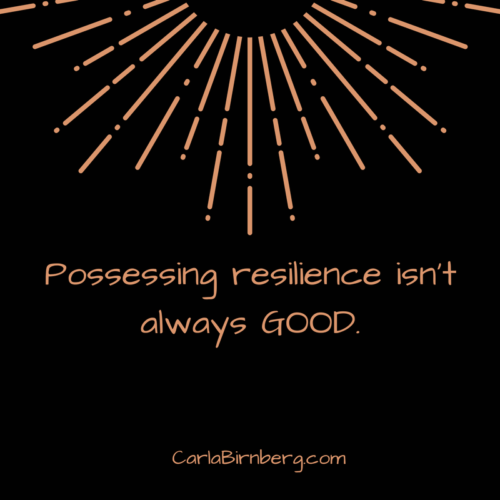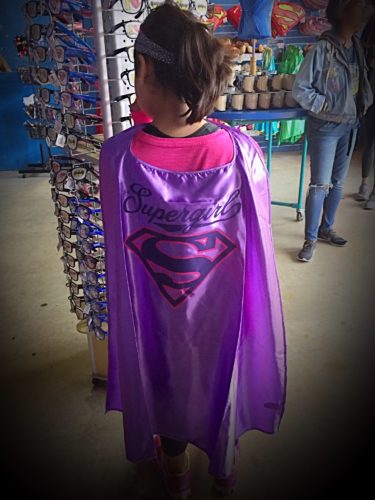We’ve hit a bumpy patch around here.
It’s not so much life isn’t going well, I just see pitfalls on the path ahead and hold my breath (literally & metaphorically) as the Child hesitates and attempts to navigate around them.
My role used to be the bumpers along the sides of the bowling alley–easily able to keep her safe and ‘in play’— and I’ve now become relegated to spectator (or told about the game long after it’s concluded).
Admittedly not the best metaphor, but one which conjures the clearest image in my cranium.
In addition, because scenario of Child-as-master-of-her-domain is new to me, I’ve not yet found the language which serves to encourage her.
As a result, I’ve fallen back on old wording.
I’m proud of you. You’re so resilient! has become a refrain.
You’ve got this! You can bounce back! has morphed into my MamaCatchphrase.
Spoiler alert: I’ve vastly oversold the importance of resilience.

Resilience, as most of us know, is the act of adapting or boinging back in the face of a challenge.
We (if by ‘we’ you mean Carla which before yesterday I did) tend to believe the longer we battle a situation the more resilient we are.
We (if by ‘we’ you mean schools, workplacesettings and society in general) reward examples of resilience and, should it not be evident, discuss ad nauseam how to create/instill more.
Watching the Child ‘spring back’ through her world has challenged my beliefs:
Can too much resilience result in banging our heads against the proverbial wall?
Or, to frame in a way 12 more easily understood, if resilience is our superpower then does it simultaneously become our kryptonite?

In the past I’ve framed resilience as “good.”
I’ve defined it as a trait which is extraordinarily positive and indicative of an ability to cope and be successful in life.
Lately I’ve witnessed immediate resilience is not always a good thing.
Too much bouncing back results not in restoration of spirit, but depletion.
Key, it seems, is to exert effort, stop, breathe/pause/rejuvenate and only after an intermission consider giving resilience another shot.
Resilience, when defined as capacity to rapidly recover from stress or difficulty, may not set us up for life-success.
The resilience I’ve past applauded (where time is of the essence and the more swiftly we evidence pliability the better) may not be emotionally healthy or beneficial in the end.
Can too much resilience result in tolerating situations from which we’d otherwise, even temporarily, walk away?
My new answer is YES.
A modified version of: If at first you don’t succeed–quit.
I now advocate selective resilience.
Still a believer in ‘feeling all the feelings‘/embracing potentially painful emotions, yet (finally) concurrently aware there are times we need to avoid experiencing sentiments in order to continue functioning.
Selective resilience offers the option of snuggling down into the space between what was and what will be and choosing not to be immediately adaptable.
Selective resilience is self-preservation.
And you?
- Have you, too, encouraged resilience at all costs for yourself and others?
- Have you, unknowing, practiced selective resilience in your life?
 Bea says
Bea says
March 26, 2018 at 4:51 amI need to think about this more because I focus on resilience a lot with the twins too.
I guess I’ve always thought about it like rebounding instead of having a pity party
 Allie says
Allie says
March 26, 2018 at 5:25 amI usually give myself time to wallow and then try to get over it. However, depending on the severity of the situation (some are whoppers!) I have learned the only way to “bounce back” is to go straight though it and feel all the feelings. This is so interesting though because I had not thought about being selective in this way before. Interesting.
 Wendy says
Wendy says
March 26, 2018 at 7:04 amI never thought of resilience as an excuse to pack it up and walk away for self-preservation. I always think of resilience as a trait that allows people to persevere through a tough situation. With all the mama drama that comes with raising teenagers, I often wonder why some kids are more resilient than others. Is it an innate trait? Or can it be learned?
You’ve got me thinking.
 Kay Newton says
Kay Newton says
March 26, 2018 at 7:41 amIt is always difficult to watch your child hit rocky patches and you always want the best for them. Children often mirror their parents, and your understanding of resilience will become theirs. Sometimes walking away gives you the capacity to recover quickly as long as it is understood that it is perfectly ok to do so.
 Leanne | www.crestingthehill.com.au says
Leanne | www.crestingthehill.com.au says
March 26, 2018 at 8:31 amI lost my resilience for a while a few years ago – it was not a fun thing to have happen and it made me a bit lost and whiny. I do like your selective resilience idea – but I wouldn’t want to lose mine EVER again.
 Haralee says
Haralee says
March 26, 2018 at 9:11 amOh this is good! Selective resiliency is the way to go, otherwise time, effort and pain can be used up on not such a worthy or important cause.
 Cherylann says
Cherylann says
March 26, 2018 at 10:09 amThe words I have always used with my kid (who is still my “kid” at 31) were “I am here for you. I love you and will help you through anything in which you choose to ask me for help.” She has figured out more on her own without me saying anything to her….she just knows I am here if she needs me.
 Kate says
Kate says
March 26, 2018 at 10:24 amA big part of resilience is adaptability, and that includes the ability to adapt yourself to the reality that some things SHOULDN’T be tolerated, and that some times there ARE walls you have to step back from, walk around, or turn away from. Resilience for me has always been the ability to recover from those defeats of SELF, where my perception, stubbornness or belief has been challenged, and I need to bounce back not with the SAME attitudes, behaviors and beliefs, but with adapted ones.
The tree bends because it has NEW life, it’s green. The branch that breaks is the branch that has remained unchanged, has gone dead inside a little (or a lot), that is incapable of growth.
Resilience and growth go hand in hand.
I don’t think you can oversell either. But I will say, “You’ve got this” might be tempered by “how do you think you can do this differently?” or “What is your goal to doing this? Do you think there are other ways?”
 Ellicia says
Ellicia says
March 26, 2018 at 3:59 pmMy mantra on resilience is from W. C. Fields. He said, “If at first you don’t succeed, try, try again. Then quit. There’s no point in being a damn fool about it.”
 Kate says
Kate says
March 26, 2018 at 5:49 pmI so wish I could hit a “like” button for this comment!
 messymimi says
messymimi says
March 26, 2018 at 5:15 pmW.C.Fields supposedly said something to the effect of “If at first you don’t succeed, try, try again. Then quit. No use being a d***ed idiot about it.”
Sometimes (and some people and some situations) are just not good for us, and walking away is.
 Hempworx CBD Oils says
Hempworx CBD Oils says
March 31, 2018 at 8:19 amIts not easy to watch your children go through rough stages of life as you always want the best for them in any situation. I think we should give them time to get over it and give them some space. Resilience is never an excuse.
 Jerry Moore says
Jerry Moore says
April 12, 2018 at 9:03 amWe as parents always want that our children do not face hard times.We can do anything for that Jerry